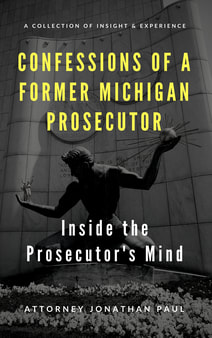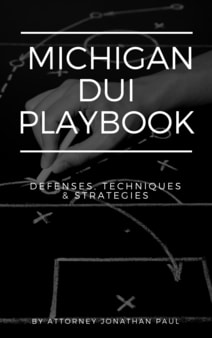|
Michigan DUI second offenders have experience with the criminal justice system. This person has been arrested before, been arraigned in front of a judge, met with an attorney about their case, and ultimately made a decision to go to trial or plead guilty to a crime. Jail becomes a real possibility for a second offense, and a second offenders number one priority is usually avoiding jail.
Along with the possibility of jail for a Michigan DUI second offender comes mandatory license revocation for your Michigan license and vehicle immobilization of your vehicle for 90 days. If you're facing a Michigan drunk driving second offense, you are also wise to enter alcohol therapy as soon as possible, because alcohol rehabilitation is mandatory for repeat offenders. Being pro-active about your alcohol issue may convince a judge that you're taking this problem seriously, and could convince that judge that jail is not necessary. Your decision the first go around will probably influence your decision for your Michigan DUI second offense. You may be kicking yourself for not challenging the first drunk driving charge, and may be more aggressive the second time. No matter your decision, be mindful that a second conviction means you're only one conviction away from a felony for a third offense and mandatory jail. Read the 34th District Court DUI Survival Guide Michigan DUI second offenders have experience with the criminal justice system. This person has been arrested before, been arraigned in front of a judge, met with an attorney about their case, and ultimately made a decision to go to trial or plead guilty to a crime. Jail becomes a real possibility for a second offense, and a second offenders number one priority is usually avoiding jail.
Along with the possibility of jail for a Michigan DUI second offender comes mandatory license revocation for your Michigan license and vehicle immobilization of your vehicle for 90 days. If you're facing a Michigan drunk driving second offense, you are also wise to enter alcohol therapy as soon as possible, because alcohol rehabilitation is mandatory for repeat offenders. Being pro-active about your alcohol issue may convince a judge that you're taking this problem seriously, and could convince that judge that jail is not necessary. Your decision the first go around will probably influence your decision for your Michigan DUI second offense. You may be kicking yourself for not challenging the first drunk driving charge, and may be more aggressive the second time. No matter your decision, be mindful that a second conviction means you're only one conviction away from a felony for a third offense and mandatory jail. Click here to read the Macomb County DUI Survival Guide Oakland County 2nd DUI - Bloomfield Hills 48th District Court Judge Small, Barron, D'Agostini5/13/2017
Michigan DUI second offenders have experience with the criminal justice system. This person has been arrested before, been arraigned in front of a judge, met with an attorney about their case, and ultimately made a decision to go to trial or plead guilty to a crime. Jail becomes a real possibility for a second offense, and a second offenders number one priority is usually avoiding jail.
Along with the possibility of jail for a Michigan DUI second offender comes mandatory license revocation for your Michigan license and vehicle immobilization of your vehicle for 90 days. If you're facing a Michigan drunk driving second offense, you are also wise to enter alcohol therapy as soon as possible, because alcohol rehabilitation is mandatory for repeat offenders. Being pro-active about your alcohol issue may convince a judge that you're taking this problem seriously, and could convince that judge that jail is not necessary. Your decision the first go around will probably influence your decision for your Michigan DUI second offense. You may be kicking yourself for not challenging the first drunk driving charge, and may be more aggressive the second time. No matter your decision, be mindful that a second conviction means you're only one conviction away from a felony for a third offense and mandatory jail. Click here to read the 48th District Court DUI Survival Guide Michigan DUI second offenders have experience with the criminal justice system. This person has been arrested before, been arraigned in front of a judge, met with an attorney about their case, and ultimately made a decision to go to trial or plead guilty to a crime. Jail becomes a real possibility for a second offense, and a second offenders number one priority is usually avoiding jail.
Along with the possibility of jail for a Michigan DUI second offender comes mandatory license revocation for your Michigan license and vehicle immobilization of your vehicle for 90 days. If you're facing a Michigan drunk driving second offense, you are also wise to enter alcohol therapy as soon as possible, because alcohol rehabilitation is mandatory for repeat offenders. Being pro-active about your alcohol issue may convince a judge that you're taking this problem seriously, and could convince that judge that jail is not necessary. Your decision the first go around will probably influence your decision for your Michigan DUI second offense. You may be kicking yourself for not challenging the first drunk driving charge, and may be more aggressive the second time. No matter your decision, be mindful that a second conviction means you're only one conviction away from a felony for a third offense and mandatory jail. Click here to read the Ann Arbor DUI Survival Guide If you're charged with drunk driving in Michigan, you may decide to proceed to trial. If you decide to have a trial by jury, the first part of the trial will be jury selection.
Once jury selection is over, the prosecution will make their opening statement, which will generally summarize the date and location when the Defendant was operating a vehicle. From there the prosecution will tell the jury how the police made contact with the Defendant, how they knew the Defendant was driving, and what if anything did the Defendant say to the police. Now the prosecution will talk about any field sobriety tests conducted and ultimately the arrest of the Defendant; once arrested the prosecution will tell the jury about either the DataMaster or blood test result. Once the prosecution sits down, your attorney will make their opening statement, which will present your theory of the case, problems with the prosecution's case and reminders about the burden of proof. It is important to make a great first impression with the jury, and gain their trust as their leader in examining the evidence. The most effective method for making an opening statement is through the power of storytelling. Your attorney should fully explore the entire arrest experience from beginning to end to fully understand your story. Opening statement is an excellent time for your attorney to frame the issue and simplify the case for the jury. This is not the time to get defensive about the evidence, but rather put forth a pro-active and optimistic view of the evidence. One of the most important roles during opening statement is to clearly define the burden of proof, not as "did the accused commit the crime, or not commit the crime", but rather "did the accused commit the crime beyond a reasonable doubt". Criminal trials are not 50/50; there are not two equal options, which the jury must be convinced, but rather only one option (beyond a reasonable doubt), which is either met or not met. There are circumstances where your attorney may decide to reserve opening statement until the prosecution has rested their case; this is a rare situation, but could be highly effective. Click here to read the Novi DUI Survival Guide |
|
Ann Arbor Office LocationPlymouth Office Location |
Representing DUI Clients in MichiganRepresenting clients charged with a DUI in Ann Arbor, Canton, Brighton, Howell, Saline, Adrian, Taylor, Plymouth, Northville, Westland, Ypsilanti, Pittsfield Towsnhip, Warren, Sterling Heights, Farmington, Pontiac, Romulus, Lansing, Novi, South Lyon, Southfield, Birmingham, Bloomfield Hills, Royal Oak, Troy, Rochester, Jackson, East Lansing, Garden City, Livonia, Dearborn, Detroit, St Clair Shores, Hazel Park, Ferndale, Madison Heights, Waterford, Milford, Shelby Township Clarkston, Oak Park, Berkley, Fraser, Sterling Heights, Clinton Township and others throughout Washtenaw, Wayne, Monroe, Jackson, Genesee, Macomb, Ingham, Lenawee, Livingston and Oakland County.
|


